Tim Jones's Blog, page 24
September 5, 2013
Roundup, Not By Monsanto
What y'all been doin', Tim?
I've been saving the Basin (working hard on it, anyway).
I've been reviewing Michael Morrissey's new science fiction novel Tropic of Skorpeo for Landfall Review Online.
I've put up a guest post by James Cone called Social Democracy and the Next Settlement.
P. S. Cottier and I have been continuing to make progress on the anthology we're co-editing, The Stars Like Sand: Australian Speculative Poetry. Penelope has had the signal honour of being chosen as Australian Poetry's inaugural (online) Poet in Residence: http://www.australianpoetry.org/2013/09/04/introducing-p-s-cottier/
I've interviewed New Zealand fantasy writer Helen Lowe, whose book The Gathering of the Lost has been shortlisted for the David Gemmell Legend Award for Best Fantasy Novel. I'll link that interview from this post as soon as it's online.
I've even, after a long largely dry period since I finished writing the poems in Men Briefly Explained, starting writing some new poems.
I've been busy!You can buy books by Tim Jones online! Voyagers: SF Poetry from NZ from Amazon.Transported (short story collection) from Fishpond or New Zealand Books Abroad.
I've been saving the Basin (working hard on it, anyway).
I've been reviewing Michael Morrissey's new science fiction novel Tropic of Skorpeo for Landfall Review Online.
I've put up a guest post by James Cone called Social Democracy and the Next Settlement.
P. S. Cottier and I have been continuing to make progress on the anthology we're co-editing, The Stars Like Sand: Australian Speculative Poetry. Penelope has had the signal honour of being chosen as Australian Poetry's inaugural (online) Poet in Residence: http://www.australianpoetry.org/2013/09/04/introducing-p-s-cottier/
I've interviewed New Zealand fantasy writer Helen Lowe, whose book The Gathering of the Lost has been shortlisted for the David Gemmell Legend Award for Best Fantasy Novel. I'll link that interview from this post as soon as it's online.
I've even, after a long largely dry period since I finished writing the poems in Men Briefly Explained, starting writing some new poems.
I've been busy!You can buy books by Tim Jones online! Voyagers: SF Poetry from NZ from Amazon.Transported (short story collection) from Fishpond or New Zealand Books Abroad.

Published on September 05, 2013 18:26
September 1, 2013
Guest Post: Social Democracy and the Next Settlement, by James Cone
Intro by Tim
I attended a public meeting organised by Generation Zero about New Zealand's lamentable record on greenhouse gas emissions, and the current Government's obsession with building motorways at the expense of all other transport option - which reminds me to say: please write a submission against the Government's proposed Basin Reserve flyover! (Submissions close Friday.)
At this event, James Cone asked a question which I thought was very interesting, but which it was hard for him to get across briefly. Talking to James afterwards, I suggested that the issue he raised might go better as a blog post - and here it is! See what you think.
Social Democracy and the Next Settlement
Social democracy, the way the
English-speaking countries were governed after World War II, until the first
peak oil in the 1970s, was a deal. Government authorised unions to
bargain and strike, so workers got paid well, so they made things for
manufacturers to sell, so manufacturers made a profit, so they could pay
workers well.
To understand how deals like that work, it's probably
worth-while to take a short side-trip into what 'because' means.
Aristotle recognised four kinds of cause. A final cause is what
something is for. A formal cause is what plan it follows. Efficient
causes are the ones that we take for granted now, where the ankle-bone moves, because
the hip bone is moving, and they are connected via the knee bone.
Material cause took me a long time to understand; it is where an object,
such as a table, is there because it's outline is full of stuff, such as the
wood that it's made of.
Social settlement have to satisfy needs for final
causes (often expressed as people thinking they're fair), formal causes (the
rules can be written) and efficient causes (the manufacturer, worker and customer
in my example are all well-enough off).
That deal makes two assumptions: that
having more suff is good for people, and that there is no constraint on the raw
materials and energy that go into making it. The second is now definitely
false, and the first is being re-examined.
In the new conditions, I do not
know what the next social settlement is, yet. I think that I'll recognise
it when I see it. I'm looking for a plan where the children of
beneficiaries and minimum-wage workers eat a diet with enough first-class
protein and no unavoidable conspicuously harmful features, as a natural
consequence of the way the rest of the political-economic world is organised.
Bio: James Cone
James is a 'lost', a magpie, and a
cognitive barbarian. So far, he has studied four years of Computer
Science, had one career in computing, completed two thirds of a sociology
degree, and now walks someone else's dogs (names removed to protect the guilty)
on a voluntary basis. He has been collecting small, shiny ideas since almost
before he could talk. Given a situation that resembles a Gordian Knot, he
thinks that the right response is often to imagine a novel slice through it.
If you ask, he may talk to you about non-violence theory and wicked
problems, but this will not make your life simpler.
You can buy books by Tim Jones online! Voyagers: SF Poetry from NZ from Amazon.Transported (short story collection) from Fishpond or New Zealand Books Abroad.

Published on September 01, 2013 18:00
August 26, 2013
Tuesday Poem: Ghosts, by Maria McMillan
I have seen ghosts
sliding under the
surface,
skittish things
flitting
in the boat’s wake
but
only one has seen me.
A sea snake spiralled
out of the water
looked straight into my
eyes
and was gone.
The dead can be
reckless
I thought and then
Do I think this is
death?
When I said goodbye to
our sister
she curled small,
would not let me touch
her,
never once lifted her
face
while I was in the
room.
My father cried
my mother patted me on
the shoulder
and looked beyond me
to the garden.
I am not afraid of the
sea
or the sun on my throat
or the gasp of the
wind.
I am not afraid of the
nights
where the sail is a
shroud,
where we are not
floating
but a weight passed
forward
by many hands.
Credit note: "Ghosts" is included in Maria McMillan's first collection of poetry The Rope Walk (Seraph Press, 2013) and is reproduced here by permission of the poet and the publisher.
Tim says: I've enjoyed hearing Maria's poetry at various venues over the years, and so I was very pleased to hear that her first collection was coming out from Helen Rickerby's Seraph Press. I recently read the collection and enjoyed all of it, but two especial highlights for me were "Ghosts" and "1989", which Helen has recently run as a Tuesday Poem on her blog.
"Ghosts" is a beautiful, delicate and moving poem, and beyond that, I think it speaks for itself.
The Tuesday Poem: Sails beyond the sunset, and the baths of all the western stars.
You can buy books by Tim Jones online! Voyagers: SF Poetry from NZ from Amazon.Transported (short story collection) from Fishpond or New Zealand Books Abroad.

Published on August 26, 2013 04:49
August 21, 2013
Trevor Reeves (1940-2013): Poet, Editor, Publisher, Activist
I was saddened to hear this week of the death of Trevor Reeves. Here is the notice I received:
I first met Trevor when I joined the Values Party in 1977. Subsequently, we were both involved in the Save Aramoana Campaign - the successful campaign against plans to build an aluminium smelter at the entrance to Otago Harbour. Later, as I got more interested in writing, I realised that Trevor was also a fine poet and a dedicated poetry publisher. He published a number of my poems in Southern Ocean Review, one of New Zealand's first online poetry journals which also spawned a print edition, and ran to 50 issues.
Science fiction was among his many interests, and we included an extract from a fine poem by Trevor in Voyagers: Science Fiction Poetry from New Zealand.
It is a sad truth of New Zealand poetry that South Island poets and publishers are often marginalised or ignored. Trevor was a fine poet and a major figure in poetry publishing for many decades. I hope that his achievements and his life will be given the recognition they deserve.
You can buy books by Tim Jones online! Voyagers: SF Poetry from NZ from Amazon.Transported (short story collection) from Fishpond or New Zealand Books Abroad.
Trevor Reeves (1940-2013) was an anarchic and unsung hero of NZ poetry and publishing. In the early 70's he taught himself to handset type and, using an old platen press he founded Caveman Press and printed and published many of NZ's most beloved poets - JK Baxter, Hone Tuwhare, Peter Olds, Alan Loney and many many more. As a graphic designer, writer, poet, editor, reviewer, book importer, publisher and more he was responsible for producing scores of poetry, prose, fiction, non fiction, magazines, online editions and reviews of both NZ and international writers. As Square One Press and Southern Ocean Review he presented to the world his and many others words and worlds. Trevor Reeves was indispensable to NZ literature and NZ literature owed Trevor a massive debt.
I first met Trevor when I joined the Values Party in 1977. Subsequently, we were both involved in the Save Aramoana Campaign - the successful campaign against plans to build an aluminium smelter at the entrance to Otago Harbour. Later, as I got more interested in writing, I realised that Trevor was also a fine poet and a dedicated poetry publisher. He published a number of my poems in Southern Ocean Review, one of New Zealand's first online poetry journals which also spawned a print edition, and ran to 50 issues.
Science fiction was among his many interests, and we included an extract from a fine poem by Trevor in Voyagers: Science Fiction Poetry from New Zealand.
It is a sad truth of New Zealand poetry that South Island poets and publishers are often marginalised or ignored. Trevor was a fine poet and a major figure in poetry publishing for many decades. I hope that his achievements and his life will be given the recognition they deserve.
You can buy books by Tim Jones online! Voyagers: SF Poetry from NZ from Amazon.Transported (short story collection) from Fishpond or New Zealand Books Abroad.

Published on August 21, 2013 21:39
August 7, 2013
An Interview With Saradha Koirala

Saradha Koirala is a Wellington poet, who takes great pride in also having a day job. She has been teaching secondary school English since 2005 with occasional writing breaks. In 2007, she earned a MA from Victoria University’s Creative Writing programme and last year she tutored Creative Writing at Massey University.
Saradha’s poetry has been published in various literary journals and she is a contributing editor to Lumiere Reader, focussing on book reviews and interviews. Although poetry is her favoured form, finding time to string words together in any context makes her extremely happy.
1) Saradha, Tear Water Tea is your second poetry collection, following Wit of the Staircase . Back in the days when albums were the most important things that bands released, music magazines used to talk to bands about the "difficult second album". Was there any difficulty involved in producing your second collection, or did it all come together quite smoothly?
Ah yes, I wrote a blog post last year titled ‘The difficult second book’ with exactly this in mind. I think the difficulty comes particularly if the first book was a success and there’s an expectation to live up to or exceed that with the second. This wasn’t necessarily the issue for me, but there were a number of difficulties: not wanting to be a ‘one hit wonder’ (to perpetuate the music magazine metaphor) was definitely one of them.
‘Wit of the Staircase’ was written during an intense year completing ‘the Manhire course’ at Victoria. There were imposed deadlines, eager tutors, constant feedback, critical class mates – the whole thing was very heavily guided and the book had to be completed within a strict timeline. I enjoyed this way of working, but wanted to prove I could also complete something solo. I do think writing is a very solo activity so if I could write a book I was proud of largely on my own, then I would prove to myself that I really could write.
Another difficulty was that I had to make tough decisions about leaving work to complete ‘Tear Water Tea’, which I really did want to be a much ‘better’ book than ‘Wit of the Staircase’. I applied for funding and thought a lot of about the implications of giving up the day job to frivolously write poems. But the process of writing was not difficult in itself, just the expectations and, I guess, a kind of audacity I had to muster to make writing – just writing – a priority.
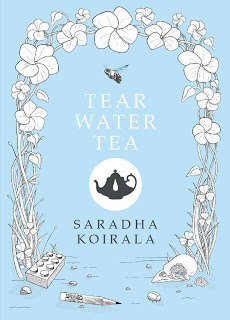
2) Does the new collection have a significantly different focus to "Wit of the Staircase", or do you think readers will notice a continuity between the two?
I think there’s both difference and continuity. Again, because ‘Wit of the Staircase’ was written during that one intense year, I feel the poems reflect a very specific time and a very specific thought process. Even the poems where I’m remembering the past are filtered through the time from which I was looking back.
The poems in ‘Tear Water Tea’, however, were written over a longer period of time, so there was less need to reminisce or conjure up past thoughts and feelings. I hope there’s a sense of immediacy to the poems – a poem written about a particular feeling was written while that feeling was fresh. But then it’s not such a long time on the scale of things, since I wrote ‘Wit’, so there are definite similarities in style. The same characters – my brother, mum and dad – appear and a few significant new ones have emerged.
3) What does the lovely and alliterative title Tear Water Tea refer to?
There’s a wonderful children’s book by Arnold Lobel called ‘Owl at Home’. In it are a bunch of stories about Owl doing this and that but the one that really spoke to me as a kid was ‘Tear Water Tea’ in which Owl holds his tea pot and thinks of all the things that make him sad – stubby pencils that can no longer be used, spoons lost behind the stove – he fills his teapot with tears and then makes a pot of tea! The quirkiness of this story and the list of things Owl comes up with is very appealing.
There are numerous times in my life when I could’ve brewed a strong pot of tear water tea, and the phrase became well-used in my family to explain particular feelings and inexplicable sadness. It’s a bit of a gloomy title, perhaps but I love the sound of it and, as I hope the cover shows, there are moments of inexplicable joy too!
4) Not only does the cover of "Tear Water Tea" look beautiful, but the book also features interior illustrations by David Randall Peters . How did that collaborative process work out?
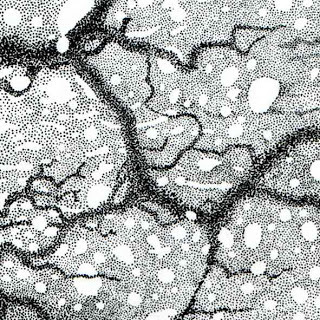
I am really really happy with the illustrations and cover. They add a depth and detail to the book that I could never have achieved on my own. It was a bit difficult for me though as David is an absolute perfectionist and took a very long time to complete each part. It was difficult for him too because he did want to get it right and make something beautiful for me that also complemented the poetry.
The illustrations are part of one image that was painstakingly produced in pointillist style – 0.02 millimetre dot by 0.02 millimetre dot. The vision for this came quite easily for David after reading the complete manuscript, and then I chose where the separate sections were placed throughout the book.
The cover was much harder to get started and we looked at lots of different designs – both antique and contemporary – and talked at length about how to “sum up” the mood of the work without giving too much away. I like the illustrative, hand-drawn style a lot and in the end am pleased he took his time with it to make it so beautiful, even if I got quite anxious at times having relinquished a sliver of control over the project.
5) You mention elsewhere in this interview that using simple language to convey complex emotions is something that you value highly in poetry. One of the things I admire about your poetry is its economy - and that's expertly on display in my Tuesday Poem this week, A secret I don't mind you knowing where you say a great deal in a few words. It made me think of a poet such as Paul Celan, whose utterances grew shorter and shorter - though, in his case, the language stayed rather complex! So ... preamble over ... do you imagine that your poems will get shorter and shorter over time, or do you also have long, elaborate poems in your future?
I hope I have both in me, but I have tried to write longer poems in the past and found I tend to edit them back anyway, eliminating repetitive images or places where I've 'spelled things out' too explicitly. But it's not my intention to say things with as few words as possible - although that might be quite a cool exercise at some point (I'm thinking now of Ian McEwan whose novels have been set over shorter and shorter periods of time) - it's more about leaving things open and letting the reader in to wander around the poem; never saying more than is necessary to convey or suggest meaning. I'm quite keen to explore different forms in the future and perhaps different ideas will demand different lengths.
Having said that, I do love haiku and the challenge of creating resonating images in so few syllables. Crafting is important to me - as well as incredibly satisfying - and I hope to avoid writing rambling, incoherent poetry for as long as possible.
6) Are you planning some readings to follow up the launch of ‘Tear Water Tea’, and if so, can you yet tell us where and when you'll be reading?
Yes I am, but these are still in the planning stages. I’d like to take the book on a bit of a tour around the North Island at some point and I am planning a second launch in Nelson after my Wellington launch.
7) Who are some of the poets who have influenced your own work?
I read a lot and I guess anything I read has potential to influence my own work, consciously or otherwise. My favourite New Zealand poets are always James K Baxter, Janet Frame and Hone Tuwhare – I reread their work all the time. I have piles of poetry books all around my house: local and recent books by my computer; a pile by my bed which includes Carol Ann Duffy, Billy Collins, Simon Armitage and Dylan Thomas; and the old classics in the shelves. It sounds a bit silly to say I’m influenced by Shakespeare but I love the way his sonnets use such simple language to convey such complex emotions. That’s something I value highly in poetry.
8) And finally, who are some of the poets you currently enjoy reading - especially lesser-known ones - and whom you think readers of this interview might be interested in?
Recently I’ve enjoyed Vaughan Gunson – both his book ‘this hill, all it’s about is lifting it to a higher level’ and his various online postings; Reihana Robinson’s ‘Aue Rona’ is a masterful reworking of myth and I found Maria McMillan’s series of poems in ‘The Rope Walk’ particularly intriguing. I really like your last book too, Tim! There are some images in there that come to mind often – especially in relation to human interactions and family.
You can buy books by Tim Jones online! Voyagers: SF Poetry from NZ from Amazon.Transported (short story collection) from Fishpond or New Zealand Books Abroad.

Published on August 07, 2013 14:57
August 5, 2013
Tuesday Poem: A secret I don't mind you knowing, by Saradha Koirala
I’m
easily awkward.
Clumsy
elbows in doorframes
I
can fall over from a standing start.
I
pull my temper
like
colourful scarves
endlessly
from clownish sleeves.
Impressive.
And
Friday after work
I
carry my wine bottle
like
a bludgeon.
Never
give a sword to one who can’t dance.
Sometimes
I smell of washing
left
too long alone.
But
I’m no hit mallard
no
twist of neck and feathers
I
heal up just fine.
Pink
skin blinking beneath a swift dry lid.
Credit note: "A secret I don't mind you knowing" is included in Saradha Koirala's new poetry collection Tear Water Tea and is reproduced here by permission of the author.
Tim says: This elusive yet self-possessed poem showcases the tantalising word choices and economy of utterance I enjoy so much about Saradha Koirala's poetry. You can find out lost more about Saradha and her work in my interview with her, which I'll posting later this week. (I also recommend Saradha's poem Tika, and the following in-depth examination of Saradha's work by Harvey Molloy.)
The Tuesday Poem: Is leaving on the midnight train to Tbilisi.You can buy books by Tim Jones online! Voyagers: SF Poetry from NZ from Amazon.Transported (short story collection) from Fishpond or New Zealand Books Abroad.

Published on August 05, 2013 05:10
July 31, 2013
Regeneration: New Zealand Speculative Fiction II
Regeneration: New Zealand Speculative Fiction II, edited by Anna Caro and Juliet Buchanan, was launched at Au Contraire 2013, this year's NZ National Science Fiction Convention.*
Regeneration contains my story "Rescuing the Airmen" and 21 other excellent stories of New Zealand speculative fiction. You owe it to yourself to get a copy - in paperback or ebook formats - and you can do so through Random Static or Amazon.
Here is a review of Regeneration from Debbie Cowens, and here is the wonderful cover by Emma Weakley:
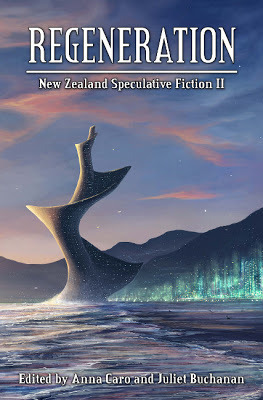
If you'd like to know more about Regeneration and its authors, check out the series of interviews Anna Caro has conducted with authors whose stories appear in the anthology - they are interspersed through her blog posts.
*I had an excellent time at Au Contraire, even though I spent quite a lot of the convention locked in the editing suite. Unfortunately, I got too busy immediately afterwards to write it up, but here's a neat report on the convention from Cassie Hart, and Anna Caro talks about the Con on her blog from an organiser's perspective.You can buy books by Tim Jones online! Voyagers: SF Poetry from NZ from Amazon.Transported (short story collection) from Fishpond or New Zealand Books Abroad.

Published on July 31, 2013 18:07
July 29, 2013
An Interview With Latika Vasil
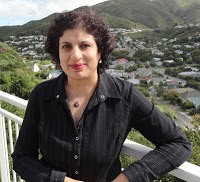
Latika Vasil was born in
India, moving to New Zealand with her family as a young child. She has mostly lived in Wellington with a
couple of overseas stints in the States and Singapore. She has worked in the education sector as a
researcher and lecturer, as well as in the public service as a research
adviser. In 2010 she completed the
Advanced Diploma in Creative Writing at Whitireia Polytechnic. Her stories have been published in various
literary journals and anthologies, including Landfall, Takahe and Hue and Cry, and broadcast on Radio New
Zealand National. Her first collection
of short stories, Rising to the Surface,
has recently been published by Steele Roberts Publishers. Currently Latika spends most of her time
writing fiction, working as a freelance researcher and writer, and doing
volunteer work.
1) Latika, how long
have you been working towards this first short story collection?
It feels like much too long!
In actuality I’d say the writing of the stories occurred over a period
of 3-4 years and then getting the book ready and out probably took another
year. I’m quite a slow writer and it took me a while to get together enough
stories so that I would have a pool of stories from which I could select the
ones that worked best together as a collection.
2) Rising to
the Surface features a stunning cover by Michael Soppitt: it not only
looks great, but from what I know of your fiction, it also fits what's inside
the book very well. How did you manage to find such a great cover?
I’m glad so many people have responded so well to the
cover! Finding the cover fell into place
quite nicely. I had an image in my mind
of something involving an underwater scene but a surreal take on that. Water is a strong motif in the book with
several of the stories featuring the ocean at pivotal moments in the
character’s lives. I also liked the feeling of people being inside a bubble,
which the cover depicts so beautifully, as I feel many of my characters are
living inside their own little bubble worlds. So having this concept in my mind
I turned to the internet, as you do, and found this photograph by Michael
Soppitt in the UK, and he kindly agreed to me using it! I feel very lucky that
I was able to have some input into choosing the cover.
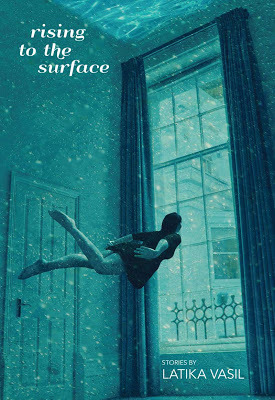
3) How would you
describe the style of story in Rising to the Surface to a reader
who isn't familiar with your work?
I would say the stories are strongly character-driven and
the settings tend towards urban New Zealand.
There’s a lot of contemporary Wellington in the stories. I did try to create some variation though in
style and voice. There are male and
female narrators, characters of different ages and lifestyles, and tonally the
stories are quite varied. Having said
this, I think there are some thematic threads linking the stories – the idea of
disconnection and loneliness. Many of
the characters are at a point in their lives where they are perhaps adrift and
looking for something to hang onto – something a bit more substantial. This all sounds slightly heavy but I’ve been
told by many readers that the stories have a sense of humour too!
4) Was it a difficult
job to choose a set of stories that would work well together in your debut
collection?
First of all I felt quite happy that I had enough stories to
be able to pick and choose! I tried to
select stories that had enough variation to keep things interesting but also
with links and connections so that hopefully it feels like the whole is greater
than the sum of its part. I think this is really important in a collection. It
doesn’t have to be overt but I think there has to be some sense of
connectedness to the stories.
5) Especially in a
debut collection, the first story in the book plays the key role of introducing
the potential reader to the author and her work. What made "The Sand Mandala" just the right story to open the collection?
Yes, it’s like music – the first track on an album is so
important. It sets the tone and hopefully
lures the listener (reader) into your little world. One of the reasons I chose “The Sand Mandala”
is that everyone kept telling me it was their favorite story and insisting I
start with it! I think it works well
because it had many of the features and themes that are mirrored in some of the
other stories – the idea of the chance encounter and how that can be a catalyst
for reflection and change. I also liked
the visual quality to the story as it leaves the reader with lots of lovely
images. It felt like a positive note to
start with even though it is partly about death and impermanence.
6) I'm noticing a
strong trend towards publishers, e-publishers in particular, wanting novellas
at the moment - a complete change from a few years ago, when they were very
hard to place. Do you write, or have you thought about writing, longer forms of
fiction?
Definitely. And
you’re absolutely right about the new interest in novellas. As a writer I guess novellas provide a nice
middle ground between short stories and novels. I’ve always been a huge novel reader so I
would love to write one. This would
involve a different writing approach for me as I tend to be quite intuitive and
chaotic when writing stories. I don’t
overly plan the story at the outset and often just ‘go’ with the character and
follow where they lead. I think with a
novel there has to be some structure and planning ahead of time. Chaos will not
do! I have a few ideas bubbling away at
the moment for novels…
7) Who are some of
the authors who have influenced your own writing?
I have read a lot of short story collections the past few
years – Lorrie Moore, Binnie Kirshenbaum, Alice Munro, have been highlights. Elizabeth Strout’s beautiful collection of
linked short stories Olive Kitteridge has been influential. I like the idea of linked short stories and
would love to explore that in my own writing.
8) And who are some
of the authors you currently enjoy reading and whom you think readers of this
interview might be interested in?
Recently I have been reading several Indian-American
writers. Both Jhumpa Lahiri and Chitra
Banerjee Divakaruni are amazing short story and novel writers.
You can buy books by Tim Jones online! Voyagers: SF Poetry from NZ from Amazon.Transported (short story collection) from Fishpond or New Zealand Books Abroad.

Published on July 29, 2013 13:33
July 22, 2013
Tuesday Poem: Mountains, by Sarah Jane Barnett
1
Her brother sits on the couch
and suggests climbing the Remarkables
with their parents, his bare
hairy foot jiggling, and she
says ‘hmmm’ while her girlfriend
prepares couscous in the kitchen.
‘You weren't there as a kid,’ she says.
2
In the levelled lot next door, relief
men dig out stumps to make space.
She likes to think they communicate
by pungent emission—she spends
hours against the window.
3
It takes a long time to dig out the heavy roots.
4
Her girlfriend—Sarnia—leads the way.
The system of mountains stretch like panic,
montane, a complex breath.
She watches Sarnia's thighs:
upturned stratified formations wrapping around
her flanks. Her axial crystals, a gulf
of sweetness and relief.
5
The wind unfastens a sheet of soil
from the skin of the track. It sweeps out and over the ridge:
a lifted conversation or smudges of rain.
The range grows wider and higher
as they move south. Each new face
takes on its own personality. She can't see the granite,
but a woman, and then two men in the rock.
Far below the lake rests in the basin
as the mountain replicates itself across the lake.
6
She once went to a talk at the university
about the creation of mountains. The expert
moved over the stage like a buoyant wave of radiation.
His voice intruded upward. He told them
it was fairly common for rock that does not fault
to fold. It will do this either symmetrically
or asymmetrically. There aren't other options:
it is upfold or downfold, anticline or syncline.
She left the lecture and walked downtown to a bar.
This was during her dark phase: dark dresses,
her hair dyed dark in the laundry sink. In the bar
she drank white Russians and let a man—older,
a crusher—put his hand between her legs.
He gave her a long string of beads he'd brought back
from Peru. At least that is what he said.
7
Given time, the pressure of water will invert relief.
The soft upthrust of rock is worn away and the anticlines
become gentle. She rises up and down.
Over time she dissolves mountains by breathing.
In bed Sarnia says, ‘There is no universal definition
for mountain. It’s okay to live with ambiguity.’
She puts on her teacher's voice with its sexy
unspoken argument over elevation and steepness.
8
Upon ascent, the women expand and cool.
The subalpine forests of needled trees break
the sun into phosphorescent waves.
‘A mountain must be higher than a hill,’ she says
as the track threads around an elbow of scarps.
‘What, then, is a hill?’ Sarnia asks.
9
Years later they climb Puncak Jaya, the highest
peak in New Guinea. It will be after the death of Sarnia's
sister, but before everything else.
The peak rises five thousand meters above the sea:
a precise measure of their strength and courage, or
Nemangkawi to the locals.
10
Outside the guests are arriving. Her parents’
car pulls up and they wave their hands
in front of their mouths. Her brother continues
to talk about mountains, and how he found
his true essence of self. ‘You should do it, man,’ he says
with conviction, such a small tremble.
Credit note: "Mountains" was first published in JAAM 29 and subsequently included in Sarah Jane Barnett's debut collection, A Man Runs into a Woman (Hue and Cry Press, 2012). It was included in Best New Zealand Poems 2012, where it is available in both text and audio formats. You can also watch a video of Sarah reading the poem. The poem is published here by permission of the author.
Tim says: I recently read A Man Runs into a Woman and, although there are many fine poems there, it was "Mountains" that particularly stood out to me for its combination of technical excellence and emotional heft. (Plus, I am a sucker for anything about mountains!). I wouldn't normally run a poem as long as this as my Tuesday Poem, but I hope you will agree with me that the poem's gradual unfolding is worth the wait.
The Tuesday Poem: rocks and rolls the place.You can buy books by Tim Jones online! Voyagers: SF Poetry from NZ from Amazon.Transported (short story collection) from Fishpond or New Zealand Books Abroad.

Published on July 22, 2013 05:11
July 7, 2013
My June Book Watch Column From The New Zealand Herald
Here's my June Book watch column from the New Zealand Herald:
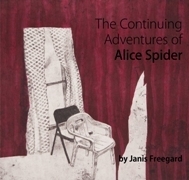
from The Continuing Adventures of Alice Spider,
by Janis Freegard - print and ebook - http://www.anomalouspress.org/books/alice.php
Janis
Freegard is an excellent New Zealand poet who features an alter ego called
Alice Spider in many of her poems. This US-published chapbook brings together a
number of the Alice Spider poems. Their characteristic tone is wry and
sometimes surreal, but don’t be fooled: Alice is a character who goes for what
she wants and gets things done. It’s a joy to read such sparky poetry.
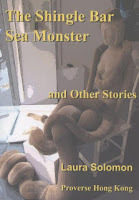 The Shingle Bar Sea Monster and Other Stories,
The Shingle Bar Sea Monster and Other Stories,by Laura Solomon - print and ebook - http://www.amazon.com/The-Shingle-Monster-Other-Stories/dp/9888167359
Laura Solomon is a New Zealand writer whose work tends towards magic
realism: stories in which fantastic events take place in an otherwise realist
world. It’s a style of fiction most closely associated with Latin American
writing, but in this collection Laura Solomon uses it to make what might
otherwise be low-key stories ‘pop’, as they say in Hollywood: her characters,
many of them girls and young women, show their mettle when confronted with
bride-seeking sea monsters, angels, and men who howl for the moon, among other
unsettling factors. Well worth reading.
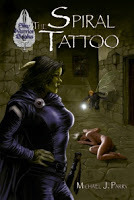 The Spiral Tattoo, by Michael
The Spiral Tattoo, by MichaelJ. Parry - ebook - http://www.amazon.com/The-Spiral-Tattoo-ebook/dp/B0058DUKOU
I enjoyed this entertaining novel about a large troll and
a small flying Eleniu who are partners in the City Guard of a trading city with
six sentient races. While there's nothing especially original in this fantasy
world, it makes a good backdrop to the murder investigation which is at the
foreground of the story. Although I felt the villain, one of the most
intriguing characters, was kept in the background a bit too long, I had a lot
of fun reading this story – enough that I’ve now bought the second book in the
series.
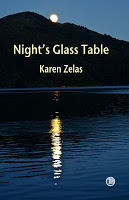 Night's Glass Table by Karen
Night's Glass Table by KarenZelas - print and ebook - http://ipoz.biz/Titles/NGT.htm
It took me a little while
to warm up to this collection by Christchurch poet Karen Zelas — I felt as
though the poems were keeping me at arms’ length — but once I got used to her
quiet but insistent style, I enjoyed these sharply-observed poems about
relationships, travel, family, and life in post-quake Christchurch. There is a
lot of poetic technique, and many years of thought, at play here.
You can buy books by Tim Jones online! Voyagers: SF Poetry from NZ from Amazon.Transported (short story collection) from Fishpond or New Zealand Books Abroad.

Published on July 07, 2013 23:24



